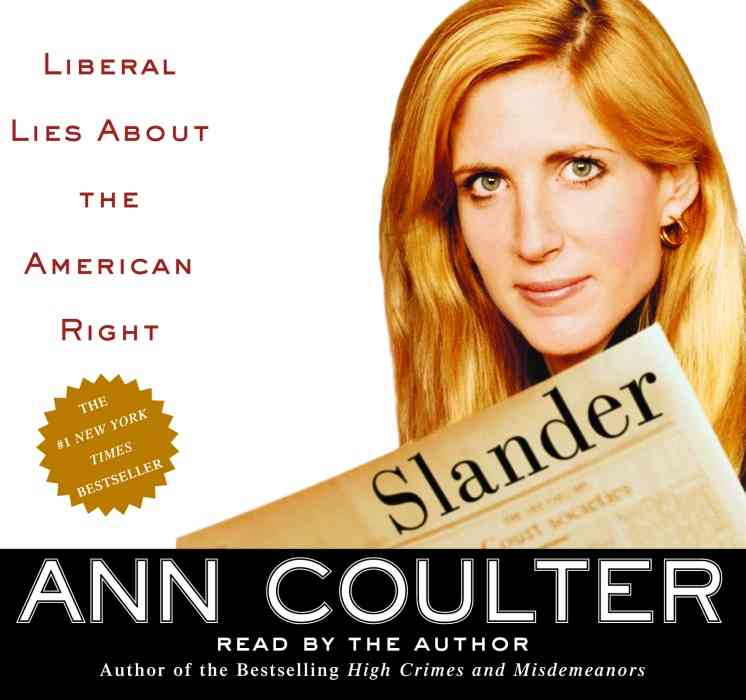
Meaning of SLANDER
| Pronunciation: | | 'slandur
|
 WordNet Dictionary WordNet Dictionary |
| |
| | Definition: | |
- [n] an abusive attack on a person's character or good name
- [n] words falsely spoken that damage the reputation of another
- [v] charge falsely or with malicious intent; attack the good name and reputation of someone; "The journalists have defamed me!" "The article in the paper sullied my reputation"
|
| |
| | Sponsored Links: | |
|
| |
| | Synonyms: | | asperse, aspersion, besmirch, calumniate, calumny, defamation, defame, denigrate, denigration, smear, smirch, sully |
| |
| | See Also: | | accuse, assassinate, attack, badmouth, calumny, charge, defamation, drag through the mud, hatchet job, libel, malign, mud, obloquy, speech act, traduce, traducement | |
 Products Dictionary Products Dictionary |
| |
| | Definition: | |  Slander
Legal affairs expert Ann Coulter attacks what she sees as a liberal bias in government and the media, and the resulting debasement of political discourse. She says liberals engage in vicious personal attacks on conservatives, trash their ideas, and refuse to acknowledge their accomplishments. Coulter names names, and offers her view on how to realign the terms of the debate--and why it is important to do so. more details ... |
| |
 Webster's 1913 Dictionary Webster's 1913 Dictionary |
| |
| | Definition: | |
\Slan"der\, n. [OE. sclandere, OF. esclandre, esclandle,
escandre, F. esclandre, fr. L. scandalum, Gr. ??? a snare,
stumbling block, offense, scandal; probably originally, the
spring of a trap, and akin to Skr. skand to spring, leap. See
{Scan}, and cf. {Scandal}.]
1. A false tale or report maliciously uttered, tending to
injure the reputation of another; the malicious utterance
of defamatory reports; the dissemination of malicious
tales or suggestions to the injury of another.
Whether we speak evil of a man to his face or behind
his back; the former way, indeed, seems to be the
most generous, but yet is a great fault, and that
which we call ``reviling;'' the latter is more mean
and base, and that which we properly call
``slander'', or ``Backbiting.'' --Tillotson.
[We] make the careful magistrate The mark of
slander. --B. Jonson.
2. Disgrace; reproach; dishonor; opprobrium.
Thou slander of thy mother's heavy womb. --Shak.
3. (Law) Formerly, defamation generally, whether oral or
written; in modern usage, defamation by words spoken;
utterance of false, malicious, and defamatory words,
tending to the damage and derogation of another; calumny.
See the Note under {Defamation}. --Burril.
\Slan"der\, v. t. [imp. & p. p. {Slandered}; p. pr. &
vb. n. {Slandering}.]
1. To defame; to injure by maliciously uttering a false
report; to tarnish or impair the reputation of by false
tales maliciously told or propagated; to calumniate.
O, do not slander him, for he is kind. --Shak.
2. To bring discredit or shame upon by one's acts.
Tax not so bad a voice To slander music any more
than once. --Shak.
Syn: To asperse; defame; calumniate; vilify; malign; belie;
scandalize; reproach. See {Asperse}.
|
| |
 Legal Dictionary Legal Dictionary |
| |
| | Definition: | | Spoken defamation which tends to injure a person's reputation. (See libel.) |
| |
|
|